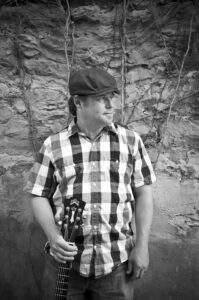Adam Carroll
Want to hear a good story? Listen to any Adam Carroll song. His Texas peers sure have, over and over again, and are quick to heap superlatives on a stoic artist whose compositions provide a solitary glimpse into a verdant imagination.
Jon Dee Graham says Carroll "may be the best songwriter that Texas ever produced," while Robert Earl Keen proclaims, "If all were right with the world, Adam Carroll would be the Townes Van Zandt of our age."
"His lyrics are like a good book: They take you somewhere and leave you better than they found you," says Terri Hendrix.
Slaid Cleaves calls Carroll "the quintessential small-town songwriter," adding, "Travel outside the cities of this country and you'll recognize the barbecue-joint waitresses, the rice farmers, the karaoke singers, the black-flag pirates and the hi-fi lovers of this land--you'll meet them all in Adam's true-to-life songs."
Now, with the release of two new albums--I Walked in Them Shoes is a solo effort, wile Good Farmer was recorded in tandem with his wife, Chris Carroll--there are more characters to meet, at once fascinating and familiar.
Carroll grew up in Tyler, Texas, which he describes as "pretty southern" compared to other Lone Star habitats, in the '70s and '80s. This led him to identify with great southern bards like Flannery O'Connor and Lucinda Williams, even if he felt a bit out of place in his hometown.
“I had a few friends, but I was very shy—still am,” he explains. “But I was pretty good at reading, so I tended to live in my head. I was kind of imagining writing stories for myself.”
Music was a constant in the Carroll household. Adam’s mom is a musician, while his dad had a killer record collection—John Prine, Johnny Cash, Jimmie Rodgers, and the like. Adam took piano lessons and sang in a choir, but when he purchased Neil Young’s Harvest as a senior at a North Carolina boarding school, he developed a fervent desire to play guitar.
That itch would get scratched at Tyler Junior College, where, Carroll recalls, “there was a really good guitar teacher, Frank Kimlicko.” Carroll worked in a coffee shop near campus that featured live folk music, and his appreciation for Prine deepened. When he went to see a Prine show at the Majestic Theatre in Dallas, Carroll says, “I couldn’t believe how good he was. He was the first artist I saw live who met every expectation I had of a performer.”
Eventually, observers would come to say the same of Carroll. But it would take awhile for him to find his comfort zones.
"I've just always been kind of a reclusive guy,” he says. “I moved from Tyler to the Austin area, and I tried living in Austin for a little bit. I had a real hard time with it.”
But then Carroll ambled into Cheatham Street Warehouse in San Marcos, a college town in between Austin and San Antonio. Opened in 1974 by Kent Finlay and located hard by a set of railroad tracks, Cheatham Street ranks among Texas’ foremost songwriting incubators, with George Strait, Stevie Ray Vaughan, Todd Snider, James McMurtry, Sunny Sweeney, Terri Hendrix, and Jamie Lin Wilson all cutting their chops on the honky-tonk’s stage.
“I just felt really at home there,” says Carroll, who wound up moving to San Marcos. (He and Chris now live in nearby Wimberley.)
“Night at the Show” from Carroll’s new solo album is a tribute to Finlay, who passed away on Texas Independence Day in 2015, while “My Only Good Shirt” is dedicated to Lloyd Maines, the legendary Texas producer (and father of Dixie Chick Natalie) who helmed several of Carroll’s records. Finlay’s daughter, Jenni, produced the album Highway Prayer, a 2016 tribute to Carroll that saw his tunes covered by the likes of Cleaves, McMurtry, Terri Hendrix, Jamie Lin Wilson, Walt Wilkins, and Hayes Carll. Musicians aren’t typically the subject of tribute albums until they’re dead or sick (Carroll’s neither); the fact that so many of Carroll’s peers jumped at the chance to participate in Finlay’s project is testament to his outsize influence.
That influence extends north of the Canadian border, where Carroll met his future wife at a music festival in her hometown of St. Catharines, Ontario, in 2012. They had each gotten sober, and connected over that commonality as their fellow headliners howled at the moon. Chris was already a fan of Adam’s music and was “blown away” when she saw him play. She wasn’t shy—and, unlike Adam, isn’t in general—about expressing her high opinion of him, which got him out of the psychological rut he was in at the time.
“Anytime anybody would tell me I was good as a writer or performer, I couldn't ever hear it and I couldn't say it to myself,” says Carroll. “I feared success. I had a hard time taking compliments. Chris was such a fan that her support has given me a new lease on looking at myself and my music. She believes in it so strongly that it's helped me to believe in it.”
She’s also helped him become a better musician, and the two have an easy chemistry that extends from Good Farmer to the road, which they traverse in an RV with their three dogs.
“Having Chris to play with has actually improved my solo playing,” he says. “I’ve had to learn more about being a guitar player. And her singing that accents a lot of my songs, it's making me want to be a better musician. I'm trying to learn harmony; she's really good at it. Playing with Chris is making me see that I can learn those things on my own now. I'm willing to do it because she's willing to do it. I'm trying to be a better guitar player to make her sound better, to be a complement to what she's doing."
